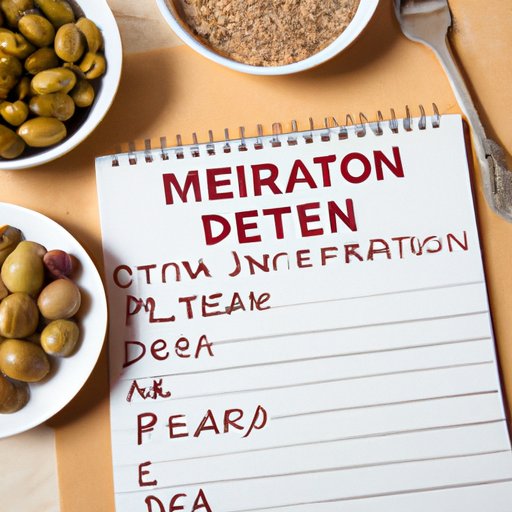
Introduction
The Mediterranean diet has become increasingly popular over the years due to its numerous health benefits. This diet is based on the traditional foods that people used to eat in countries like Greece and Italy in the 1960s. The diet is not only beneficial for your health, but it is also a delicious way to eat. In this article, we will explore what a Mediterranean diet is, the health benefits of it, specific ingredients, and tips for adopting the diet in your everyday life.
A Detailed Guide to the Mediterranean Diet: The Foods, Benefits, and Meal Plans You Need to Know About
The Mediterranean diet derives from the traditional eating patterns of people living in Mediterranean countries. It emphasizes whole grains, fruits, vegetables, nuts and seeds, and healthy fats while limiting red meat and sugar. Fish and seafood are consumed at least twice a week, with moderate consumption of cheese and yogurt.
The Mediterranean diet has been linked to numerous health benefits, including a reduced risk of heart disease, certain cancers, and Alzheimer’s. One study found that the diet can decrease the risk of disease by 25%, improving overall longevity.
Different versions of meal plans have been created, but a typical Mediterranean diet meal plan includes:
- Breakfast: Greek yogurt with honey and fresh berries, whole grain toast, and coffee
- Lunch: A vegetable-filled salad with chicken, avocado, and almonds and an olive oil and balsamic vinegar dressing
- Dinner: Grilled salmon, roasted vegetables, and a quinoa salad with feta cheese and sun-dried tomatoes
Exploring the Delicious and Nutritious Ingredients of the Mediterranean Diet
The Mediterranean diet is rich in a variety of delicious and healthy ingredients. Some of the key ingredients to the diet include:
- Olive oil: a monounsaturated fat that is full of antioxidants and can help lower cholesterol levels
- Fish: rich in omega-3 fatty acids that are known to reduce inflammation and decrease the risk of heart disease
- Nuts and seeds: rich in healthy fats, fiber, and protein to keep you full and satisfied
- Veggies: a great source of vitamins, minerals, and antioxidants to keep you healthy and support immune function
Here are a few recipe ideas that incorporate these ingredients:
- Roasted salmon with lemon and herbs, roasted veggies with olive oil and sea salt, and a side of quinoa or brown rice
- Roasted mixed nuts with sea salt and herbs for a healthy snack
- A Greek salad with feta cheese, kalamata olives, and a homemade olive oil and vinegar dressing
How to Adopt the Mediterranean Diet in Your Everyday Life: Tips and Tricks for Success
One challenge when adopting a Mediterranean diet is that it’s different from what most Westerners are used to eating. However, there are a few tips to help you succeed:
- Start slowly: Incorporate one or two Mediterranean-style meals per week and build from there.
- Find healthy swaps: Instead of using butter, try using olive oil for cooking and as a dressing for salads.
- Make it social: Share meals with friends and family. Mediterranean-style eating is all about enjoying food together with loved ones.
Try developing healthy habits, such as eating more meals at home or incorporating more local and seasonal foods.
Why the Mediterranean Diet is Proven to be One of the Healthiest Eating Patterns in the World
There has been extensive research on the Mediterranean diet, providing evidence that it is one of the healthiest eating patterns in the world. A few benefits include:
- Reduced risk of heart disease: Studies have shown that people following a Mediterranean diet have lower cholesterol and blood pressure levels, which are some critical factors in preventing heart disease.
- Reduced risk of cancer: Eating a Mediterranean diet has been found to assist in lowering the risk of certain cancers, which are largely based on lifestyle choices, such as breast, colon, and prostate cancers.
- Reduced risk of Alzheimer’s: Studies have indicated that eating a Mediterranean diet can improve cognitive function, reducing the risk of Alzheimer’s and other cognitive disorders.
Diving into the History and Culture Behind the Mediterranean Diet: What Makes It So Unique and Popular?
The Mediterranean diet is more than a meal plan. It’s a reflection of a traditional lifestyle and culture that involves eating fresh foods, exercising regularly, and enjoying meals with friends and family. The Mediterranean diet has become a popular alternative to the typical Western diet due to its benefits and focus on whole foods. While there is some criticism that the diet depends on seafood, a variety of recipes and substitutions of plant proteins for meat can be taken advantage of on this diet.
Conclusion
The Mediterranean diet is a simple yet effective way to improve your health while enjoying delicious foods. From incorporating healthy swaps in the kitchen to surrounding yourself with a supportive community, there are many ways to make the transition to this wholesome lifestyle. Try incorporating some of the recipe ideas shared in this article, and see how it can help you towards a healthier and happier life.




